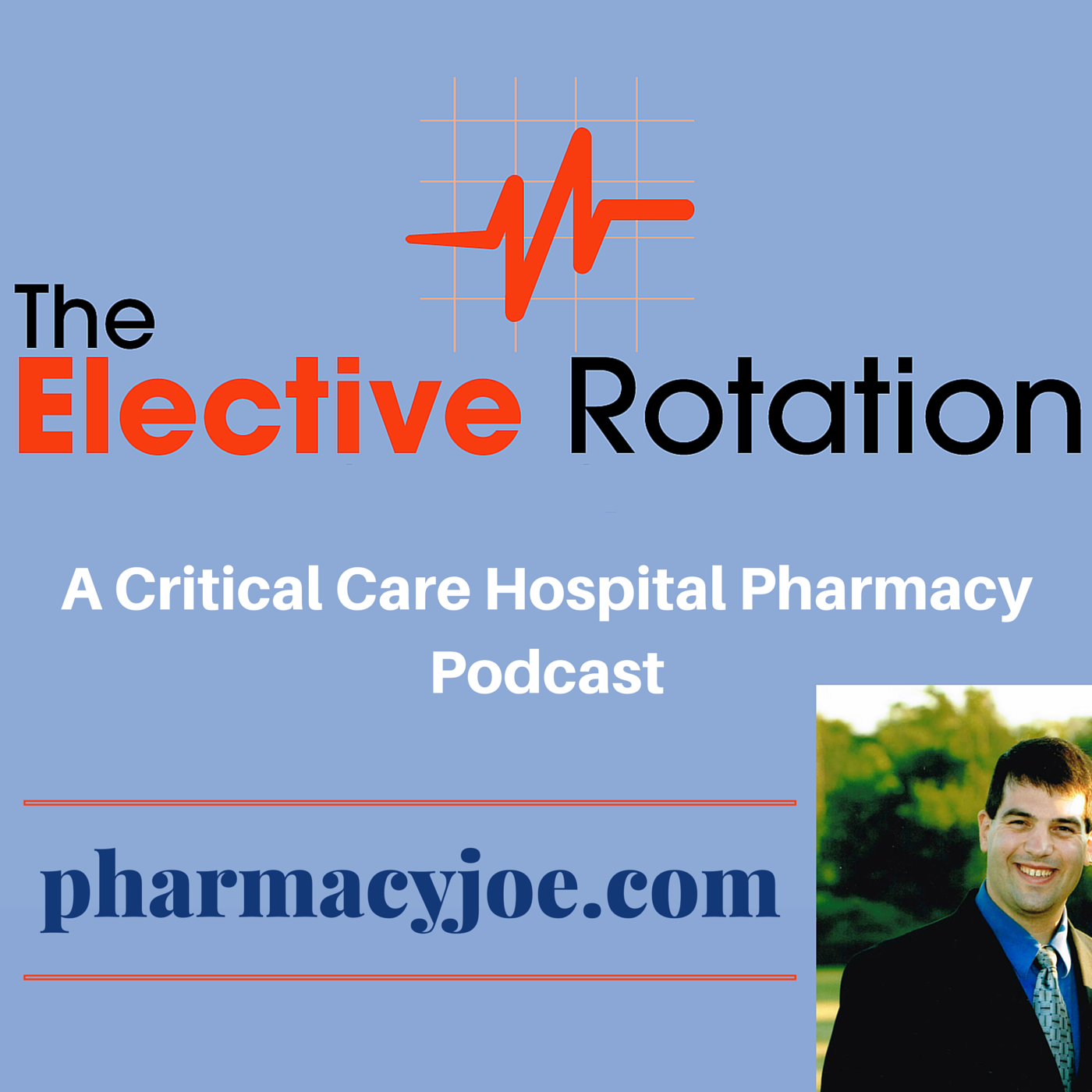In this episode, I’ll discuss how long you continue CPR after giving IV push alteplase for pulmonary embolism related cardiac arrest. Evidence: http://jtd.amegroups.com/article/view/3595/html https://www.nejm.org/doi/full/10.1056/NEJMoa012885 Get my 6 tips for pharmacists responding to codes in my free download area at pharmacyjoe.com/free. It’s download #16. If you like this post, check out my book – A Pharmacist’s Guide […]
A free twice-weekly podcast where you can listen to critical care and hospital pharmacy information
Subscribe to the #1 ranked critical care and hospital pharmacy podcast, The Elective Rotation here:
Episode 313: How to taper a dexmedetomidine infusion
In this episode, I’ll discuss how to taper a dexmedetomidine infusion. To celebrate 3 years of podcasting at pharmacyjoe.com I am giving away 3 copies of my book, A Pharmacist’s Guide to Inpatient Medical Emergencies and my 6-module Code Blue and Rapid Response Training Program for Hospital Pharmacists. To enter the contest go to pharmacyjoe.com/3. […]
Episode 312: A Pharmacist’s primer for understanding the continuum of depth of sedation
In this episode, I’ll discuss the continuum of depth of sedation. Subscribe on iTunes, Android, or Stitcher The American Society of Anesthesiologists describes sedation as a continuum from minimal sedation to moderate sedation, deep sedation, and general anesthesia. The depth of sedation can be determined by evaluating the patient’s responsiveness. In a state of […]
Episode 311: When is coag-negative staph a pathogen?
In this episode, I’ll discuss how to tell when coag-negative staph is a pathogen. Get my 6 tips for pharmacists responding to codes in my free download area at pharmacyjoe.com/free. It’s download #16. If you like this post, check out my book – A Pharmacist’s Guide to Inpatient Medical Emergencies: How to respond to code blue, […]
Episode 310: Cost effective C diff treatment, phenobarbital monotherapy in severe alcohol withdrawal, and a tip for responding to inpatient medical emergencies
Subscribe on iTunes, Android, or Stitcher In this episode I’ll: 1. Discuss an article on cost effective C diff treatment. 2. Answer the drug information question “Can phenobarbital be used as monotherapy in patients with severe alcohol withdrawal?” 3. Share a tip for responding to inpatient medical emergencies Article Cost-effectiveness analysis of initial treatment strategies […]
Episode 309: Can andexanet alpha be used to reverse heparin?
In this episode, I’ll discuss how andexanet alpha can be used to reverse heparin. Andexanet alpha has been approved for reversal of anticoagulation from rivaroxaban and apixaban. But there is also reason to believe that andexanet alpha can be used as a reversal agent for heparin. In a 2015 in vitro study in the journal […]
Episode 308: Causes, treatment, and prevention of stridor
In this episode, I’ll discuss the causes, treatment, and prevention of stridor. Subscribe on iTunes, Android, or Stitcher Causes Stridor is an abnormal inspiratory sound and is a sign of airway obstruction that requires immediate attention. Stridor can be caused by a mass or foreign body in the upper airway, or by laryngeal edema. Laryngeal […]
Episode 307: How desmopressin (DDAVP) can be used for intracranial hemorrhage
In this episode, I’ll discuss how desmopressin (DDAVP) can be used for intracranial hemorrhage. Neurocritical Care guidelines suggest consideration of a single dose of desmopressin (DDAVP) in intracranial hemorrhage associated with aspirin or ADP receptor inhibitors. Desmopressin causes the release of von Willebrand factor and increases platelet adhesion. It has a low risk of serious […]
Episode 306: Order of vasopressor discontinuation, why is daptomycin dosed once daily, and a tip for responding to inpatient medical emergencies
In this episode I’ll: 1. Discuss an article on the discontinuation order of vasopressors in the management of septic shock. 2. Answer the drug information question “Why is daptomycin dosed once daily?” 3. Share a tip for responding to inpatient medical emergencies. I have a 6-module program that teaches pharmacists how to respond to code […]
Episode 305: Critical care scenarios where the monitoring and replacement of calcium are warranted
In this episode, I’ll discuss critical care scenarios where the monitoring and replacement of calcium are warranted. Routine efforts to monitor and correct the serum calcium level in critically ill patients only treat the laboratory number; there is no evidence that replacement has an effect on patient morbidity and mortality. Furthermore, there is some evidence […]
Episode 304: Lactate clearance in sepsis isn’t as straightforward as the guidelines make it seem
In this episode, I’ll discuss how lactate clearance in sepsis isn’t as straightforward as the guidelines make it seem. Subscribe on iTunes, Android, or Stitcher The surviving sepsis guidelines state: We suggest guiding resuscitation to normalize lactate in patients with elevated lactate levels as a marker of tissue hypoperfusion (weak recommendation, low quality of evidence). […]
Episode 303: Evaluating lithium levels in the setting of lithium toxicity
In this episode, I’ll discuss how to evaluate lithium levels in the setting of lithium toxicity. When lithium toxicity is suspected, a lithium level should be drawn immediately and every few hours until a downward trend is seen. Lithium levels should continue to be checked, as delayed peaks have been reported as long as 40 hours […]
- « Previous Page
- 1
- …
- 65
- 66
- 67
- 68
- 69
- …
- 93
- Next Page »
